Director Michael Giacchino Is Happy You're Happy With Werewolf By Night [Exclusive Interview]
With "Werewolf by Night," Marvel Studios presents a Michael Giacchino horror special right on time for Halloween. Now, which fans and non-fans of the Marvel Cinematic Universe saw that coming? The comic book adaptation, based on a story that began 50 years ago in print, is more akin to classic Universal horror movies than Marvel's roster of big-screen heroes. "Kudos, Marvel," Chris Evangelista wrote in his review. "You did it. You brought back practical werewolves. Take a bow."
Giacchino wanted to go old-school with his Disney+ special. The more practical, the better. More melancholic. Classier. And, of course, presented in black and white. In a wide-ranging interview, the Oscar-winning composer-turned filmmaker told us about directing and scoring the Disney+ special, and his ambitions and hopes for his warmly-received hour-long special.
'They didn't ask to be a werewolf'
I'm guessing you had a very good birthday on Monday?
Yeah, it didn't suck [Laughs]. It was very nice. You're always nerve-wracked whenever you put something out into the world, because the world seems to like to attack things as quickly as they can, and they didn't do that. I was almost like, "Wait a minute, did I get pushed into some other universe where people say nice things, as opposed to terrible things? What is happening here?" It was so crazy.
We were all thrilled with the reception, and we had a blast seeing it all unfold, and seeing how much fun people had with it. That was the biggest thing, because that's what we wanted more than anything, was that people could just sit back, and have a blast watching something crazy and different.
So you were paying close attention to the reactions?
It was a combination of getting a million texts from a bunch of different people, and then also sending articles for me to look at. But yeah, you're just checking on the reviews and looking at everything because at first, again, like I said, I didn't know what to expect. We had a couple screenings before it opened, and those screenings went really well and people seemed to really like it, when we were at Fantastic Fest, and then also at Beyond Fest.
It was also great to have a film that you could actually show in a theater, that felt like it belonged in a theater. It was meant to be shown theatrically. That's how it was shot. I always wanted it to feel like a film that you would go to the theater to see. Marvel was great, and they allowed us to go ahead and do as many of these screenings that we could. We're doing another one this week at the New Beverly and showing it on film. We have a 35 millimeter print of it. So yeah, it was a real blast to make from start to finish. And again, the reception was great.
Was your thinking, all right, this is different, so will people accept it or reject it for that reason?
Exactly. It's exactly what the movie is about. "Werewolf by Night" is about this idea that people automatically jump to reject something that is different. You see it in the world today, just read the news, you see it all the time. Anybody who is different doesn't deserve the same rights as everyone else. I feel like monster movies are allegories for those stories.
These monsters are people that need help and support, and they need backing. More than not, they're just hunted and killed. I, as a kid, was always feeling so bad for them, because no one wants to be a werewolf. They didn't ask to be a werewolf. I can imagine the anxiety levels raise as the full moon gets closer, because they're afraid of what they're going to do to somebody else. I always felt sorry for these characters and that was the whole approach to this, was to say, "Yes, monsters exist, but the monsters, in the typical sense of things we need to kill, I don't believe they exist. I believe they need to be looked at, understood, listened to, and treated as equals." That was behind this whole story.
'Going into color was the best way to show that things are now changing and evolving'
It is standalone, but it's a cool addition to the MCU because it asks, well, why are those other characters with powers considered heroes while these characters are written off as monsters? Did you think about how "Werewolf by Night" thematically plays in the MCU's sandbox?
Oh absolutely. It was a discussion I wanted to kick the door open on, and just say, "Okay, that's fine. We all love Captain America, we get it." But here we have somebody that has these incredibly gifted powers but they can't control them or they're powers that cause them to do crazy, wild things. How do we deal with that? What does that mean? Are these people that we then just put aside and don't worry about, in the way we handle certain people in society today? It's like, you don't want to even look at that anymore. Oh no, they're in the minority, so I'm just not interested in helping them. I felt like, I don't know, this was a way of just talking about those ideas about how there are all kinds of powers in the world and, for me, being different is a superpower.
Being different is super, that's the greatest thing you can be. The more different we have in this world, the better off this world will be. If everyone is going to be the same thing, super powerful for good, blah blah blah, blah, that's heading in the direction that doesn't feel good to me. I want to embrace the different, I want to embrace the new and I want to embrace the people that have not had the support and have not been embraced by society. I feel monster movies are one of the best ways to tell that story.
So you just don't recreate the aesthetic of those classic monster movies. It's what James Whale was doing, telling stories of outcasts.
Yes, exactly. Again, these are people that need help. Think of even Frankenstein's monster, that is one of the saddest things in the world. He didn't ask to be brought back to life and built up like this. Yet there he is and the next thing you know he's being hunted down by the villagers and you're like, this is so unfair.
It is such an allegory for everything that's happening today. So I think art is reflective of our current state of society and you just gotta keep pushing in telling these stories that hopefully will eventually sink into the vast group of people that seem to want to just say no to it.
When you pitched Kevin Feige, were you like, "It's a melancholic monster story that's in black and white"?
Yes. A lot of discussions were like, look, I really want to explore this idea of depression. That's got to be really hard being that character. It's got to be sad, it's got to be very lonely. So when you do have a friend that you trust, someone like Ted, you do what you need to do to preserve that friendship. Even though it may be a pain in ass, sometimes it may be inconvenient for you to go help, but in the end, you're not going to abandon that person. It's all about these family ties.
Jack, his speech about family is that there are all kinds of families in the world. And that the one thing that does connect us all is we all have some sort of family. And that family can be a blood family, it can be friendships, it can be all kinds of things. And so again, the fact that he's not going to abandon that family, that's a big deal and that's a big selling point for me in these characters is that they actually care about each other and the way that everyone should care about each other.
With that in mind, was that the driving point behind transitioning to color at the end and showing these characters the light?
Yes. To me, in large part, this is Elsa's story. She is a huge part of this story, and she was coming to this place this night to rid herself of this baggage of her family. Some people have very supportive families, other people have really bad families that are not supportive of who they are and what they want to be. And that was the situation she found herself in. I think her coming here was a brave act to try and shed herself of all of that and start something new and begin a new path forward.
So that moment at the end where she sits down in that chair after telling Billy Swan, "Clean all this s*** up," and she sits down, that's the revelation of this new world for her. The nightmare is over. She's going to leave that behind. I don't know what she's going to do with it, I don't know where she's going, but I know that the road is open for her now. I felt going into color was the best way to show that things are now changing and evolving and hopefully the future will be a brighter place.
'I was more focused on characters in black and white than I was in the color version'
You had two monitors on the set. One was in black and white, the other was in color. How did the story play differently in color?
It looks beautiful in color, but to me, there was something that was sadder about the black and white, something that brought me in more. For some reason I was more focused on characters in black and white than I was in the color version. Both [cinematographer] Zoë [White] and I knew from the beginning we wanted the black and white, but it wasn't a foregone conclusion that we were going to be releasing this in black and white. Now, in fact, that decision wasn't made until way later, once we were in our maybe third cut of the show.
We hedged our bets and we set up monitors that were black and white only monitors so that way I could make sure that what we were shooting lighting-wise was going to work. We knew the color was going to be fine, but I wanted to be assured that if we were lucky enough to do it in black and white, we would have what we needed. Converting later and trying to make the lighting right later, that's impossible and it's a big pain.
We came at it with the attitude that, nope, it's going to be in black and white, even if we don't know if it is or not, we're thinking it's going to be. When Kevin saw it in black and white, he turned to me and he said, "I guess this needs to be in black and white, doesn't it?" And I was like, "Yes, yes, yes, it does."
For Zoë and you, how daunting was shooting a werewolf transformation?
Well, there are so many great werewolf transformations that have been done in the world and to try and outdo them felt foolish to me. The more I thought about it, I felt like that moment in the cage with Elsa, it's not even about Jack at that moment, it's about her. It's about her being in this predicament. This is exactly a representation of her whole life. She's constantly been at odds with these people and constantly been pushed into the corner by what they do and what they believe.
I felt, okay, let's not even show Jack on camera, let's have his shadow there, but really keep pushing in on her face. To me, that was what it's all about, just Elsa in that moment. I felt so bad for her being trapped there. She came here with these grand plans to try and do this. She knew it was going to be hard, she knew she was vulnerable through it all. In the end, to be exactly in the place that she had been before felt just demoralizing. I thought it was such a sad moment and to keep it on her, that's what we needed to do.
It was great because then it allowed us to do something creative with the transformation. In horror movies, it's what you don't see that is more horrifying and more scary than the things that you do see. To keep him off camera and just use the shadows, that's scarier. Hearing those sounds is scarier. And then seeing the reaction on her face as this is happening to me, that's scarier. So, that was the reasoning behind all of it. It was one of the first shots I had planned out from the very beginning.
I knew that's how I wanted to do it. It took months to make that work, because it was all done in-camera too. That whole shot, that's not a VFX shot. It was crazy to try and sort that out. The only thing that was not on set when we shot it were the bars. We had to add those in later because of the way where the projector was projecting the shadow of the transformation. We had to make sure all of that lined up and looked like it was coming from Elsa's POV.
Everything else is real. Elsa was there, the walls, everything else. The shadow was being projected as we shot it, and it was crazy how it all worked. Again, it took a lot of preparation.
Hilarious, too, because you go, oh yeah, there's a dead guy in the box over there, too.
It's so nuts. I love how Harriet calls him out. "You're going to want to see this, darling." She's still talking to the guy. That's how nuts she is.
'We did everything as old school as we could'
Was the corpse an animatronic?
Yeah, that was an animatronic. It was literally strings lifting his hands up and down. We did everything as old school as we could. If we could do practical, we did practical. When she gets her head slammed against the cage, when the werewolf reaches out and grabs her, pulls her in, that was done, we reversed it. She started against the cage and then we pulled her away from it and then we reversed that and went boom. Once you add the sound, then the little camera shake, it's crazy.
The guy who gets his neck broken when he first jumps down, turns around, hits that one guy and the guy goes flying and his head, that was another reverse shot. So we did as much of that as we could in the way that they would've done it back in the day. It was really, really fun to do that. I loved it so much. The more practical, the better.
Joe Farrell, our visual effects supervisor, did an incredible job of moving out the edges of everything. The best visual effects to me are the invisible ones, so I thought Joe did a great job. Of course, Man-Thing was digital, but we did have a Man-Thing on set as well. We had a guy in a Man-Thing suit. We had a whole animatronic Man-Thing that the actors could act against that his eyes could move and his head moves and all of that motorized, the eyes glowed red, it was crazy. It was so helpful to the actors, because normally in these situations, it's a guy with a stick and a tennis ball going, and I did not want that. I didn't want that.
I want our actors to be on real sets. Everything was built, it was all real and we had as much real of the monsters there on set in front of you. I think it shows in the way that we were able to communicate with each other and you get that bond with the characters in a way that, usually, you have to do a little more work in your head to believe it when it's happening on screen.
Was the Man-Thing on set only for reference or did you also consider using it for the whole film?
Yeah, we tried to, and we use actually a shot or two of his hands that are still in there when Jack is grabbed and all of that. Those were all motorized hands, too. They're crazy. They all moved. It was so fun to see that.
Are we going to enter an era of Michael Giacchino horror director? Is that going to happen?
[Laughs] I wouldn't say no to it, I wouldn't mind it. It would be a lot of fun. I love these kinds of movies and I love the characters that you can get to play with in these movies. I love telling real human stories under the umbrella of horror. I think that's very attractive to me. So yeah, sure, I would love to do more. Absolutely.
What about a "Travelogue: Volume Two"?
That is on the list as well. I already know what I want to do for that too, so it's a matter of sitting down and doing it. But this year was tough because I did six movies, scoring-wise, and then directed this as well. A lot of it overlapped and was happening at the same time and it was hard. I worked with the best filmmakers in the world, so they were all very nice and tried to give me room where I needed it to make it all happen. It worked out well, but it was a tough year.
'I've been making movies since I was nine years old'
The hunt itself is such a game of musical chairs. When it came to rhythm and pace there, how much did you think about music?
Constantly. I would tell the actors, "Okay, here's the tempo. Very slow. This is the tempo of the music, here's how we're moving." We would do a first take and it would end up too fast. Let's just do it even slower, even slower. It was a real communication. I even had written music prior to shooting, so I could play music for them as well, just to give the sense of, here's the mood, here's what we're going for. They'd be like, "Oh yes, okay, I see now, I get it." It's a great way of setting a mood and getting them focused on what we were doing there. I was constantly thinking in my head how I was going to score this as I'm watching the takes and all of that.
Of all your past jobs, was "Lost" a huge education in building mystery and suspense that helped you direct "Werewolf by Night"?
Yes, yes. Especially musically. That was something that was always leaning towards the suspense and what you don't see. Working on all of the movies that I have over the years, I've learned so much. It's an embarrassment of riches, the directors I have gotten to work with. 20 years of learning from people like Brad Bird, J.J. Abrams, Matt Reeves and everyone up at Pixar, all of that was certainly, for me, a masterclass in filmmaking.
I always loved making movies. I've been making movies since I was nine years old. That's all I ever did. But to get to do it at a level with these sorts of people was just an incredible gift to be able to attend the school of life in that way.
You're on a bit of a hiatus or break at the moment, right?
I really don't have anything to work on right now. I'm trying to figure out who I am anymore and what my life is.
Who is Michael Giacchino without music?
[Laughs] Yeah, exactly. That is a crazy thing. Normally I jump from one thing to the next and I don't have anything immediately in front of me right now. It's both a great feeling and a terrifying feeling. I'm taking the time to sort out what I want to do. I loved this experience so much and I definitely want to do more directing because I have really missed working with people on set and doing all of those things. Writing music has been wonderful, and I've learned so much about storytelling through that job. I'm anxious to take all of those lessons and just continue plowing forward and making things again.
'You want to honor what came before without repeating it'
Like a lot of your past scores, with "Werewolf by Night," there's a sense of history with the movies you're referencing. When you made this old school special or score for "Batman," "Apes," or "Star Trek," what's your relationship, especially musically, to the past?
Sometimes you want the spirit of the past. I think if you just repeat the past, it's a bad thing. I think "Star Trek" is a great example of that, creating something that felt it belonged here without totally ignoring what came before. You want to honor what came before without repeating it. We've all seen movies that just sort of repeat what came before, and it's not that interesting. In the end, maybe it was eating a roll of lifesavers that might be fine for that moment, but you're not going to live in it. You're not going to want to revisit it. It's just a piece of candy that you eat and it's disposable.
I like things that sort of honor the past while creating something new. It is always important, even in "Rogue One." Of course, I love John Williams and everything he did is genius and no one's ever going to be better than him, but I also thought there was room for something new even in that. It was to use the moments that John created in the right way, at the right time, in the right place as opposed to just wallpaper the whole thing with it.
I think that when you're being told a story, the audience appreciates that they don't know what to expect. That's part of the fun of being told a story, I don't need to feel comfortable, and if it makes me uncomfortable, I'm okay with that. Let me discover what's new. So delivering something new has always been important to me, and I know it's important to a lot of the filmmakers I work with as well. We all just grew up in this business with that attitude.
You've now worked with Kevin Feige in this business many times. How's his ear for music? What are his notes for scores like?
Kevin and I have very, very similar tastes in all that. There's never a lot of discussion. He trusts me, he gives me a lot of trust and a lot of room to do what I think is right. I think sometimes most of the comments will be like, and I love this, taking music out of a movie is one of my favorite things because it makes the rest of the music more important. So sometimes he'll say, "Do we need music in this part?" I'll be like, "Nope, no, we don't, let's take it out." It's more of that kind of thing.
Kevin has given me such trust over the years to do what I think is right, but I value his opinion so much. He has such great thoughts. Boy, you should see him in the cutting room, he's amazing. He's always so great when he is suggesting certain things, "Well, what if you went from there to there or this to that?" And you're just like, "Yes, you're right, you're right. That's much better." He has this really innate sense of storytelling, which is invaluable. It's why he's so in demand for all of these things, to get his eyes on it, to look at it and give his thoughts. Like I said, it's valuable. He's great at it.
Is a birthday call from him nice after an opening weekend success?
Yes, yes, yes, yes, yes, yes, definitely. Especially because he was trusting me with this thing that I loved as a kid. He asked, "Well, if you're going to direct, what do you want to do?" And I was like, "”Werewolf by Night”?" And he was like, "Really? That's what you would choose?" I was like, "Yes, that's what I would choose, because it's different. You guys haven't touched it yet. It's filled with incredible characters and stories."
And so, he put a lot of trust in me to do this. Arguably he could have said, like a lot of Hollywood does if you're just a music guy, "Why don't you stick with that?" He wasn't like that at all. He beyond believed in me, what I could do here, and I'll be forever thankful for it. I'm just glad the response was what it was, because if it was anything other than that, I would've felt so bad.
"Werewolf by Night" is now streaming on Disney+.






